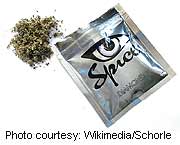- Could Your Grocery Store Meat Be Causing Recurring UTIs?
- Are You Making This Expensive Thermostat Error This Winter?
- Recognizing the Signs of Hypothyroidism
- 10 Strategies to Overcome Insomnia
- Could Artificial Sweeteners Be Aging the Brain Faster?
- Techniques for Soothing Your Nervous System
- Does the Water in Your House Smell Funny? Here’s Why
- Can a Daily Dose of Apple Cider Vinegar Actually Aid Weight Loss?
- 6 Health Beverages That Can Actually Spike Your Blood Sugar
- Treatment Options for Social Anxiety Disorder
College Students Say ‘Curiosity’ Leads Them to Fake Pot


Curiosity is the main reason why college students try synthetic marijuana, a new survey finds.
Of more than 330 students in undergraduate and graduate health programs at a public university, 17 percent said they used fake pot at least once in their lifetime, and 3 percent reported recent use, University of Cincinnati researchers found.
The leading reasons for trying synthetic marijuana included: curiosity (19.2 percent); to get high (17.4 percent), for the “fun of feeling high” (10.6 percent); to fit in (4 percent); and peer pressure (3.8 percent), the survey found.
Synthetic pot is also known as K2, fake weed, herbal incense, plant food, Spice and synthetic THC.
Negative effects from using these products included racing heartbeat, nervousness, paranoia, nausea and headaches, according to the study in the Journal of Drug Education.
Females were more likely to first try synthetic marijuana at a younger age than males — 17.8 years versus 18.4 years. Freshmen and sophomores who had tried the substance did so at about age 16 and a half, while juniors, seniors and grad students started using the substance at just under age 19.
“Based on the study’s findings, it appears senior year of high school and the first year of college is the primary time for initiating use of THC,” the researchers wrote. “Perhaps, targeting middle and high school students with education programs on the negative effects of THC is needed to prevent initiation and regular use.”
THC, or tetrahydrocannabinol, is the chemical compound in the cannabis or marijuana plant that causes the “high” effect. Synthetic marijuana is produced with chemicals to mimic the effects of THC.
The main places that college students get synthetic marijuana include head shops, friends, tobacco shops, hemp shops, online, gas stations and convenience stores.
More information
The U.S. National Institute on Drug Abuse has more about synthetic marijuana.
Source: HealthDay
Copyright © 2026 HealthDay. All rights reserved.










